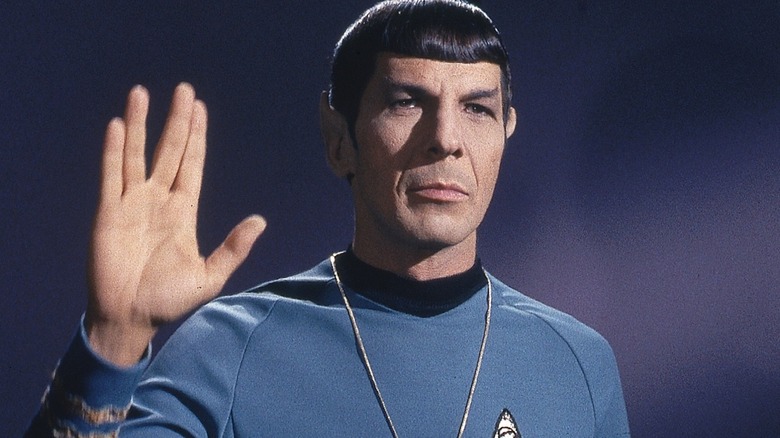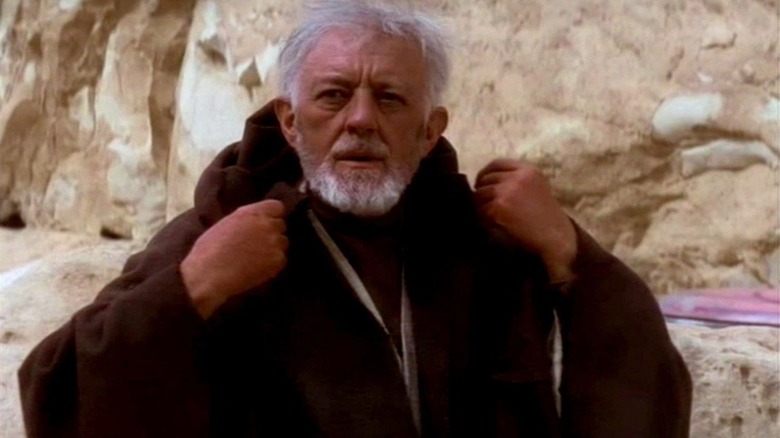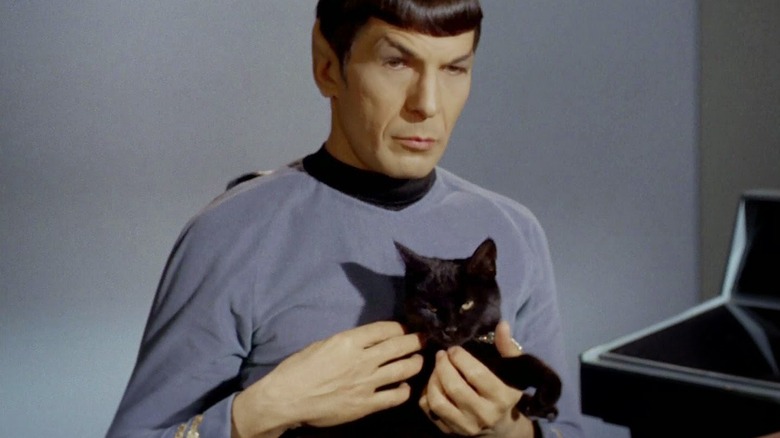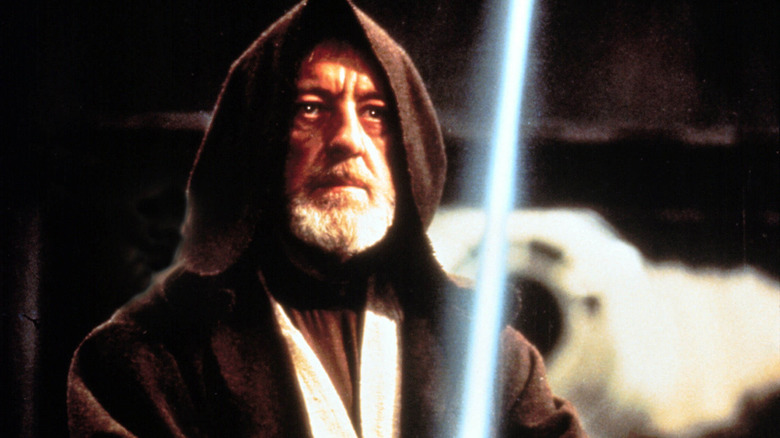/Film Showdown: Obi-Wan Kenobi Vs Spock
One is devoted to logic, the other is devoted to peace. One hails from an optimistic future, the other from a nostalgic past. One views life through data, empiricism, and scientific findings. The other views life as driven by contemplation, prayer, and the development of supernatural psychic powers. The time has come, fight fans, to pit these two pop culture giants against one anther in a fight to the death in either the Triskelion fight arena or the Geonosian execution arena. The time has come to watch Spock from "Star Trek" and Obi-Wan Kenobi from "Star Wars" battle one another for our amusement. 400 quatloos buys you a whole seat, but you'll only need the edge.
[Comedic record scratch]
But then, that's not Spock nor Obi-wan operates is it? While Spock has been trained at Starfleet Academy to handle weapons like phasers, and Obi-wan been training with a lightsaber in monasteries since he was a boy, neither of them is ever entirely eager to leap into a fight. Okay, perhaps Obi-wan has been a little reckless in the past — there was a time when he confronted General Grievous in a cavalier fashion — and perhaps Spock has, on more than one occasion, completely lost his cool — in "Star Trek Into Darkness," he nearly beats Khan to death with his fists — both of these characters are generally more devoted to peace, discussion, and philosophy than some of their respective gun-happier teammates.
So perhaps the question is not "Who would win in a battle," but "Who would win in a debate?"
Apologies, fight fans! Time to put down the vuvuzelas and pick up the notepads! Throw out that cheap beer and replace it with a glass of red wine or a well-mixed cocktail. Let's get to philosophizing.
The topic: War and peace
While Spock did recur throughout various "Star Trek" shows and movies over the decades, apart from his recasting, he never went through any character shifts dramatic enough to separate "Young Spock" from "Old Spock," so we can take any Spock as this debate's proper avatar. As for Obi-Wan, he may have been hiding out in a desert for many years, but his exile was because of the rise of the Empire, not because of any major personal failing. So "Young Obi-Wan," while perhaps more hot-headed than "Old Obi-Wan" are essentially the same character.
Perhaps the most interesting argument to be had between Spock and Obi-Wan would be their viewpoints on the necessity of war. Spock comes from a future wherein war was an increasingly moribund concept, and by the time Spock aged into the era of "Star Trek: The Next Generation" (Vulcans are notoriously long-lived), he was acting as an ambassador, surreptitiously aiding the reunification of Romulus and Vulcan. Spock was never eager to leap into a conflict, guns blazing. As he is devoted to logic and diplomacy, any conflict was to be entered predicated on the notion that war was to be avoided at all costs.
But then, Spock was not present for the rise of Senator Palpatine to the position of self-appointed Emperor, nor did he ever have to fight in the trenches alongside human meat that had been cloned en masse for purposes of violence. Obi-Wan witnessed the fall of the Galactic Senate, and found himself powerless to stop the rise of a dictator. The evil Palpatine even managed to snipe Obi-Wan's star pupil, turning him into a violent enforcer. While Obi-Wan never openly advocated for war, he did seem to feel that it was necessary (which is logical in a franchise called "Star Wars"). Obi-Wan, when he interacts the progeny of said star pupil, begins leading him down a path that would eventually lead to an extreme act of cathartic violence. Luke Skywalker likely murdered millions of people when he blew up the Death Star, but the ethics of modern warfare are not a point Obi-Wan cares to debate.
Obi-Wan draws from the philosophical traditions of St. Thomas Aquinas who, in the 5th century, argued that there was such a thing as a just war. Jus ad bellum. If conducted for a just cause, and enacted with just means (torture, for instance, is generally outside the bounds of Aquinas' definition) then war is permitted and moral. Spock would, of course, immediately jump in with some logic, asking Obi-Wan what a "just cause" actually means. Spock might bring up Thomas Hobbes (1588 – 1679) who said that the state of war warps morality. "Nothing can be unjust. The notions of right and wrong, justice and injustice, have there no place. Where there is no common power, there is no law; where no law, no injustice."
Religion
Vulcans and Jedis seem to have a lot of similarities when it comes to their religions.
Vulcans have devoted their lives to objective logic and ridding their beings of emotions. They are born with emotions, but learn to suppress them. Very occasionally, Spock might have an outburst, but for the most part retains his dignity and devotion to intellect. Curiously, however, Vulcans are not 100% empiricists. Vulcans have numerous rituals and traditions rooted in a near-dogmatic faith in logic, and there is a clergy on Spock's home planet that leads people in liturgical mass. One might assume that a religion devoted to logic would look more like a debate hall, but on Vulcan, there are robes and prayers. There is even a Messianic figure on Vulcan: Surak, the father of Vulcan civilization.
Obi-Wan Kenobi's religion is geared very specifically away from logic. Indeed, being a Jedi is very much about calming inner turbulence and using intuition to reach into people minds, or move objects psychokinetically. There is a Light and a Dark in Jediism, and there is a lot of dialogue in "Star Wars" devoted to their balance. Jediism takes a lot of its spiritual cues from Zen and from Taoism. It is about both mental enlightenment (a Zen notion) and harmony in the universe (the yin-yang). There is a very vague sense that a rise in the Dark Side is what led to the rise of fascism in the galaxy. As far as has been canonically established, there is no central Messiah in Jediism, the religion being so old, its origins are unknown. Unless you look to extra-canonical texts about the Order of Dai Bendu or something.
Both the Jedi religion and the Vulcan religion are devoted to the careful control of emotions, and both are devoted to thought over actions (at least generally speaking, there are a lot of sword-happy Jedis). Both contain meditation rituals. Both are ostensibly devoted to the truth, and neither Jedi nor Vulcans are permitted to lie. The crucial difference between Vulcanism and Jediism is that the former is an assertively pacifist philosophy while the latter believes in necessary violence and trains in weaponry as part of their faith journey. It would be on this point that Spock would perhaps have the upper hand in a debate. One cannot devote themselves to balance and peace and also have violence be an integral part of their faith.
Ultimately, peace
While Obi-Wan is a wise man with a long history and a spiritual center, there is no universe wherein he wins a debate against Spock. Spock's pacifism is simply more powerful than Obi-Wan's skill with a sword. But then, Spock, being the logical being he is, would not gloat or flout his victory. Indeed, he would likely not even declare himself a victor. He would simply have convinced another person to a more enlightened way of thinking.
Obi-Wan, meanwhile, would happily concede his points, even if he ultimately disagreed with Spock on the necessity of violence. At the end of the debate, the two fictional men would have a newfound regard and respect for one another, even if one is certainly not joining the other's cause. Obi-Wan is too driven by instinct to enter a strictly regimented and rule-oriented organization like Starfleet, and Spock would not join the Rebels in taking down the Empire, as that would be a violation of the Prime Directive.
We have no victory, then. Not really. Just two strong minds coming to interesting conclusions.



